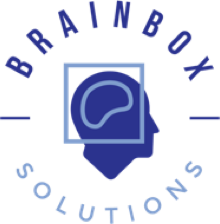Biomarker-Neuroimaging Correlations are Central to BRAINBox TBI Concussion Diagnostic-Prognostic Testing Portfolio
RICHMOND, VA. (March 17, 2023) ‐ BRAINBox Solutions today announced that the U.S. Patent and Trademark Office has issued a Notice of Allowance to issue to the company a broad patent covering a specific set of biomarkers that correlate to specific neuroimaging findings by standard or advanced MRI methods. The patent is part of the company’s extensive and growing intellectual property portfolio covering the use of novel biomarkers in combination with functional tests to diagnose individuals with concussion (mild traumatic brain injury or acute traumatic encephalopathy, ATE) and assess their risk of chronic injury.
“This new patent, and our broader portfolio, underlie the BRAINBox TBI family of diagnostic/prognostic point-of-care or main lab delivered tests we are developing for ATE,” said Donna Edmonds, CEO of BRAINBox Solutions. “The covered biomarkers provide indicators of specific brain dysfunction, enabling objective assessments of longer-term injury risk and the need further monitoring and diagnostic testing. The patent also provides a foundation for future precision applications in neurologic disease diagnosis and monitoring.” She noted that the company’s lead BRAINBox TBI test, for adults, is in the final enrollment phase in their pivotal clinical trial to support an application for U.S. market clearance.
The Initial BRAINBox ATE test will include a panel of blood biomarkers and a battery of neurocognitive tests, combined in an easy-to-use application. The test uses proprietary AI algorithms to generate an objective score for diagnosis up to 96 hours from the time of injury, and a prognosis report for the likelihood of injury-related symptoms for up to three months post-injury. The test can be used either at a point of care or in other clinical settings.
The new patent will cover the use of eight biomarkers, including Aldolase C (ALDOC) and Neurogranin (NRGN). Used singly or together, these biomarkers are highly correlated to distinct advanced MRI findings, including detection of neuronal (axonal) and glial damage, and the extent of lasting vascular dysfunction. Neuronal damage and vascular dysfunction are the most critical aspects of detecting pathology for long-term care after ATE, affecting specific areas of the brain and the efficiency with which affected areas are supported by the blood supply. The patent supports the ability to undertake, through risk stratification, more advanced diagnostics, where appropriate, by identifying patients that should be selected to undergo an MRI, setting the stage for further therapeutic intervention.
The company continues its laser focus on early injury detection and the subsequent stages in neurodegeneration and chronic disease, and is engaged in pilot studies in pediatric concussion and is enrolling subjects in HeadSMART Geriatrics, a study that is in part supported by a grant from the National Center for Neurological Disorders and Stroke (SBIR 1R44NS127732-01) to develop a geriatric specific multi-modality diagnostic and prognostic testing system for mTBI (concussion).
